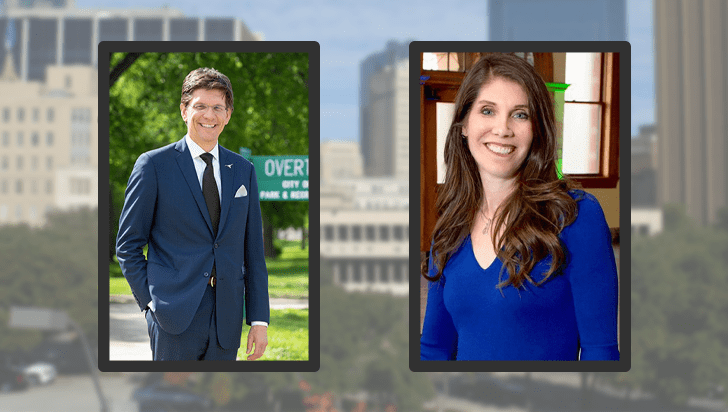While Fort Worth mayoral candidate Brian Byrd is competing against Ann Zadeh—one of the most liberal city council members—both have worked together to hike Fort Worth homeowners’ tax bills, while giving a sweetheart deal to a developer for a high-rise in Zadeh’s district.
“Brian has fought on city council to keep property taxes low and, as Mayor, will continue to fight to lower property taxes even further,” states Byrd’s campaign website.
But despite the campaign rhetoric, taxes have increased while Byrd has sat on the council. Data from the Tarrant Appraisal District shows that since Byrd was elected to city council in 2017, the average Fort Worth homeowner’s property tax bill has risen by more than 13 percent—from $1,081 to $1,223. Nearing the end of his second term, this number is now more than 46 percent higher from 2013—$835 to $1,223.
It is true that last September, Byrd made a motion to adopt a property tax rate lower than the no-new-revenue rate—the rate that keeps homeowners’ property tax bills more or less stable in the aggregate—which passed unanimously. Data from TAD shows that slightly hiked the city’s average property tax bill for homeowners by more than 2 percent from the prior year.
But Byrd’s motion in 2020 was a change in course from the majority of his time on council.
In 2019 and 2018, he voted with Zadeh to hike homeowners’ property tax bills.
Byrd voted against the proposed budget in 2019 but went out of his way to state he was not opposed to the property tax hike. “Not [against] the tax rate, Mayor, just the budget,” he said at the September 17 meeting. Only Councilman Cary Moon voted against the 2019 tax hike.
On September 12, 2017, the year Byrd was elected, he supported Zadeh’s attempt to hike the city’s property tax rate above what is now called the voter approval rate (VAR) in order to increase funding to the city’s bus service. This would have resulted in homeowners’ average property tax bill spiking by more than 8 percent from the year before.
Before Gov. Greg Abbott signed property tax reform into law in 2019, if a city attempted to adopt the VAR or an even higher rate, citizens would have to petition to trigger an election to vote down the hike. These elections are now automatic in most cities and counties if there is an attempt to hike property tax revenues by more than 3.5 percent higher than the previous year.
Moon was the only “no” vote that day, while Mayor Betsy Price and Councilmember Jungus Jordan were absent. Zadeh’s tax hike was eventually defeated due to Moon and Jordan refusing to show up to the September 22 special council meeting regarding the higher rate.
Hiking taxpayer funding of public transportation remains a priority for Zadeh.
The rate council unanimously gave final approval to resulted in a 7.4 percent hike from 2016’s rate. It is not recorded in the minutes if any attempt was made by Byrd to adopt the no-new-revenue rate or one even lower.
This isn’t the only time Byrd stood with Zadeh against citizens. While they worked together on hiking property tax bills, he supported her motion to give taxpayer dollars to developer MWG Enterprises on August 17, 2019, for construction of a high-rise in Zadeh’s district—specifically on Panther Island, as a taxpayer pointed out.
In exchange for building a “17-story, 300-unit high-rise residential tower,” MWG Enterprises would receive grants of taxpayer money worth up to 80 percent of the property taxes—$4.5 million—that otherwise would be paid to the city, so long as the developer met certain goals.
“Because you can’t get the private market to engage in constructing high-rise apartments downtown, you are proposing to give $4.5 million worth of tax breaks to somebody who is willing to do it,” citizen Geralyn Cox protested to council members. “It’s kind of like building a model for demand for downtown high-rise housing, where there is none.”
“It’s not that we have a huge shortage of apartments—we don’t—but we do have a problem where no one seems to want to build a high-rise complex on Panther Island,” she continued. “And this would be right downtown, where I regard to be the most speculative real estate development around, where we’re already leveraged at $200 billion worth.”
“Please don’t give away more of our tax money to finance speculative development,” Cox added.
Jordan was the only “no” vote on council, while Moon was absent.
A press inquiry was sent to the Byrd campaign about the difference between his campaign messaging and his council votes. Texas Scorecard did not receive a reply before publication.
Election Day is May 1, and a full list of the Fort Worth mayoral candidates may be found here.





